SINCE BEFORE YOUR SUN BURNED HOT IN SPACE, AND BEFORE YOUR RACE WAS BORN, I HAVE AWAITED… A SPOILER!
First, I’m sorry if you really loved STAR TREK: DISCOVERY‘s tenth episode of season three, the conclusion of the 2-part “Terra Firma.” I don’t mean to ruin it for you. But I need to tell this to people…to SHOUT it!!! This is a major, major screw-up I’m talking about, and I’m not kidding. So before I get to this week’s review, let’s talk about…
HOW THE GUARDIAN OF FOREVER WORKS
Okay, I can accept that the Guardian of Forever is now a cigar-chopping, bowler hat-wearing punster named Carl. Hey, people change. My old friend Nick is now Calista. Why can’t a giant rock donut time portal transform into a wooden door and spawn a comedic spokesman? I’m fine with all that.
But what I am NOT all right with is changing the essential rules of the Guardian of Forever!
“The City on the Edge of Forever” is arguably the best of the seventy-nine TOS episodes. At worst, it’s in the top three. And one of the reasons the story works so well is because Kirk and Spock are on a mission to literally save reality as we (they) know it. And in order to restore that reality, Kirk must sacrifice a woman he has fallen deeply in love with—a generous, compassionate, forward-seeing woman who could otherwise be destined for greatness if she did not need to perish in order for time to correct itself into a proper, utopian future that she herself dreamed of (whew…looooong sentence!).
Edith Keeler had to die, and we all felt Kirk’s aguish upon realizing that agonizing, unavoidable truth.
So let’s review how the Guardian works:
- If you go back in time and change something significant, reality shifts when you get back.
- If you then go back in time and fix what you broke, everything in the present returns to normal.
My friends, this did NOT happen in “Terra Firma, Part II”…
In Part I, Georgiou steps through the door, and we don’t yet know what’s going on. Is it a head trip? A holo-advenute? Is she really back in the Mirror Universe 930 years in the past? Some fans thought Carl might be a member of the Q Continuum (I hoped not because that would be a total deus ex machina move). Others noticed that the newspaper that Carl was holding—The Star Dispatch—featured the same name and logo that appeared on the newspaper header in Spock’s tricorder in “The City of the Edge of Forever.” These eagle-eyed fanatics surmised that the Guardian of Forever might somehow be involved in all of this…
Those OCD fans won the bet, of course. And that means that Georgiou really DID travel into the past because that’s what the Guardian of Forever does (and apparently, he/it can send travelers across universes, too!). We also learn that the Guardian was used during the Temporal Wars to screw up the timeline by one side and then the other side. Of course, we also know about timeships like the U.S.S. Relativity from Star Trek: Voyager, slingshotting around the sun, the Orb of Time, the Nexus, chroniton transporter accidents, Q, red matter, and a bunch of other convenient methods that exist for going back and forth through time in Star Trek‘s long history (assuming you don’t have a blue police call box handy).
But forget all of those other time travel methods. We are using the Guardian of Forever for this two-parter, and that means we need to follow its rules. And the main rule, the whole reason we have to “Back to the Future” anything we do during a Guardian trip, is that if you change the past in any major way, you return to a totally DIFFERENT future.
This means that when Georgiou went back to the Mirror Universe to become herself shortly before killing Michael Burnham—and then chose NOT execute Michael—Georgiou changed history. Of course, you could say that Michael ended up dying anyway, just a few weeks later…so no harm, no foul. But wait! According to Carl, Mirror Georgiou is drawing her last breath in that moment. She’s pretty much dead. So are Landry, Stamets, and a whole bunch of others.
But hey, why does this matter if it’s another universe? Who cares who lives and who dies?
We care! And it’s because all of this happened BEFORE the U.S.S. Discovery arrived there back in the first season! So now their whole experience in the Mirror Universe will be different. They will never encounter Empress Georgiou or Landry or Stamets…all of whom had very significant interactions with the crew! In fact, the Discovery took Georgiou back with them to the Prime Universe…something which would NOT have happened if the Empress were, y’know, dead!!!
And of course, if Discovery didn’t bring Mirror-Georgiou back with them, she couldn’t have helped defeat (and create) Control, and she wouldn’t have come forward in time with them. And so Georgiou’s molecules would never have started to break apart (because she wouldn’t have even been on the ship), the crew wouldn’t have needed to follow the yellow brick sphere data to see the Wizard (er, Guardian), Carl would never have sent Georgiou back, and none of this would even have happened.
Which means that all of it would have happened!
Which ensures that it wouldn’t happen…except then it would, leading to it not happening, which means it did happen, but then it didn’t…
MY BRAIN HURTS!!!
Anyway, Georgiou went back and changed so many things. She sbotaged the coalition rebels in their infancy, empowered the Mirror Kelpiens, and placed the Terran Empire in jeopardy a decade before Spock gets a chance to do the same. Oh, and without Georgiou around to kill Lorca, who knows what maleficence he would have gotten involved with!
So when Georgiou emerges from the doorway/gateway, reality should have shifted. But it hasn’t. And that’s just wrong with a capital WRONG. The writers are not following the rules of the Guardian of Forever!
I don’t want anyone to think that this picky little piece of Trekkie obsession ruined the episode for me. It didn’t. But it certainly didn’t help either!
For me, this episode started out pretty uninteresting and finished just barely interesting. And the main reason reason I felt this way was because I JUST DON’T CARE ABOUT THE MIRROR UNIVERSE. And frankly, I never really cared much about Empress Georgiou either. As I’ve said in previous blog entries, I thought of Mirror Georgiou the same way as I did Dr. Smith on the original Lost In Space (not the new series and new Dr. Smith; she is much more compelling). But the original Dr. Smith served no real purpose other than comedy relief, and the only reason the Robinsons didn’t just execute him in order to make their lives easier (and safer!) was because they were good people. I’m not sure that I wouldn’t have just spaced his ass. And I kinda feel the same way about Georgiou on the Discovery.
So this episode had two strikes against it from the moment it began. I have no emotional connection to the mirror doppelgängers. I care about their prime counterparts, and if the Terrans were threatening my heroes, I’d care more because I’m invested in (most of) the U.S.S. Discovery crew. Indeed, many of the best Mirror Universe visits in Star Trek history worked because the doppelgängers put the “good guys” in danger, so we knew whom to root for.
In “Terra Firma,” however, I didn’t really have a horse in the race because Georgiou isn’t exactly a fine, upstanding member of society, and Mirror Michael is just as bad or worse. So what…I’m rooting for the lesser of two evil twins? C’mon! It’s like watching your least favorite football teams play each other, and you want both to lose! And not only that, but part of me AGREED with Mirror Michael. A kinder, gentler Georgiou isn’t necessarily what that universe needs. We already discovered in Deep Space Nine what horrendous results Prime Kirk’s “pep talk” to Mirror Spock had wrought. The Terran Empire fell, and what replaced it was arguably worse. So maybe Georgiou was better off the way she had been originally.
Of course, we eventually find out that this was all a “test” by the Guardian to see if Georgiou had grown as a person. But for half of the episode, we viewers are simply watching all of this palace intrigue unfold in utter ignorance. And so we don’t know whether or not to root for or against the “reformed” Georgiou. After all, everything in this universe is backwards and upside down—just look at the opening credits…!
So maybe being good is bad and bad is good in the Mirror Universe. Not knowing about the whole “test” thing left me ambivalent as I watched all the literal back-stabbing. And hey, raise your hand if you knew all along that Mirror Michael was just faking allegiance to the Empress in order to betray her at the end. I knew it was coming as soon as Michael was first thrown into the brig. No surprises on my end.
Oh, and speaking of surprises, raise your hand if you expected to see Mirror Lorca. I’m raising mine, and frankly, I’m kinda disappointed that this is the one time they did something that I didn’t expect! I realize that they only had 30 minutes in the MU this episode, and they had to focus on Georgiou and Michael. And yeah, Lorca would have been really distracting. But even so, it might have made the first half of the episode just a little more interesting to see him again.
The other big stumble (in my mind) by the writers is that, lo and behold, Georgiou’s problem has been solved by the deus ex Carl, after all! When sci-fi writers need a fast and easy solution, they can always create an omnipotent being who will wave his/her wand and make everything okay.
The only trouble is that it can leave an audience feeling hollow and unsatisfied—even if your wizard/magician is a really cool rock donut concept from 54 years ago that the writers decided to resurrect out of nowhere for no reason other than to give MICHELLE YEOH a way off the series so that she can star in a different one. And let’s face it, having her step into the Guardian without any images in the time vortex (also not the way the Guardian works, folks!) allows Yeoh’s new series to be anywhere and anywhen. So it was a good tool to use. My only complaint is that the “Wizard” granted Georgiou’s “wish” because she proved “worthy.” There’s nothing really inspired about that kind of writing.
Of course, the writers have also just foreshadowed the end of the season (only three episodes left). In order to “fix” the damage of the Burn, someone probably needs to go back in time and prevent it from ever happening in the first place. But there’s no more time travel in the future—treaties and a civilization resisting temptation have ensured that Discovery can’t go back in time. There’s no machine or method that would allow them to do it.
Oh, wait—now there is. So let me make the following prediction (and we’ll see if I’m right in a little under three weeks)…
- The crew will uncover the secret cause of the Burn in the next episode or two.
- The only way to fix it will be to go back in time and put right what once went wrong.
- Admiral Vance won’t allow it. Time travel is verboten in the future!
- Saru, in a fit of roguish rebellion that makes him truly grok Michael for the first time, disobeys direct orders and heads to back to Carl.
- The last episode of the season takes place back in time as the crew rushes to stop the Burn. And of course, they succeed.
- Time shifts, Starfleet and the Federation never fall, and the galaxy is one big, happy place again.
Now, here’s where I’m gonna go out on a limb: I’m also predicting that the “fix” doesn’t restore the Federation to greatness but instead makes things WORSE. Admiral Vance is still there in the future waiting for them, but now he’s a schmuck, and the Federation is a bully, ruling over a galaxy rapidly running low on dilithium as Starfleet has begun hoarding it all. He who controls the methods of transport controls all!
Hmmm, maybe the crew then has to go back again to make sure that the Burn does happen, stopping themselves from stopping the Burn…but I’m not as certain of that part of the prediction.
Okay, one last thing to complain about: the toast at the end. Gag me with a gagh! It was like toasting a fungus after finally getting rid of a yeast infection!
The toast scene was really intended to honor the actress who played Georgiou, the amazing Michelle Yeoh, but the cast could have done that privately off-screen. The fact is that Mirror Georgiou was a horrible person, a pain in all of their asses, and did not deserve or earn that toast. In fact, in toasting to her merciless honesty, not one of them was truly honest to say: “Frankly, I’m glad to see her gone.” Because frankly, I’m glad to see her gone! As much as I love Michelle Yeoh, Georgiou didn’t fit into this series and should never have come forward in time to begin with.
And by the way, where was the toast when Commander Nhan left less than a half-dozen episodes ago??? There’s a crew member who deserved a heartfelt send-off!
Okay, I’ve said my piece. With luck, this is the last we’ll see of the Mirror Universe for a long, long, long time. Get on to finishing the Burn plot that you writers have spent so much time and energy setting up. You’ve got us fans intrigued and hooked. Now you’ve got three episodes left to impress us. Please make them count!
POST SCRIPT – Since publishing this blog, I have gotten many people suggesting (some more politely than others) that the Guardian somehow changed or “evolved” in the 920 years since Kirk and crew encountered the entity. So I would like to remind them of the following line spoken by the Guardian in “The City on the Edge of Forever”…
I was made to offer the past in this manner.
I CANNOT CHANGE.

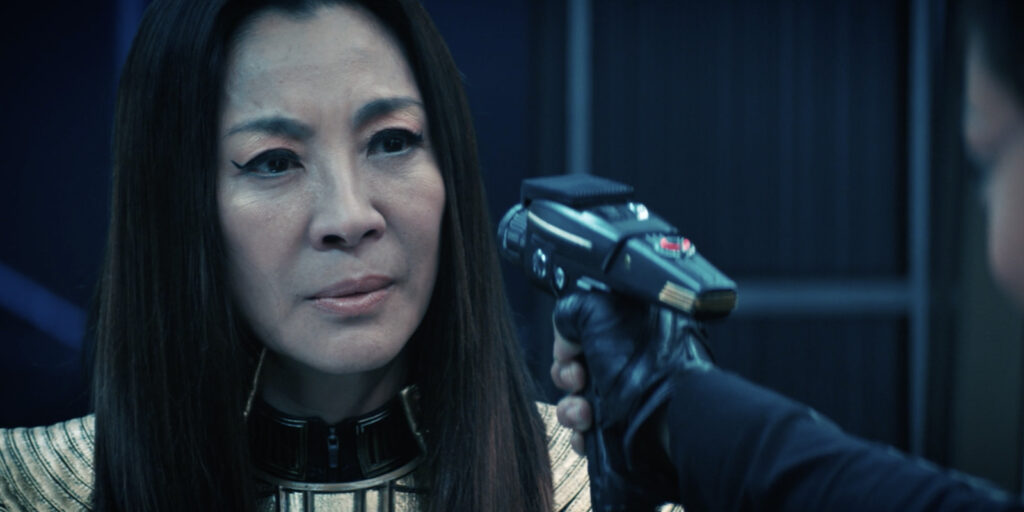
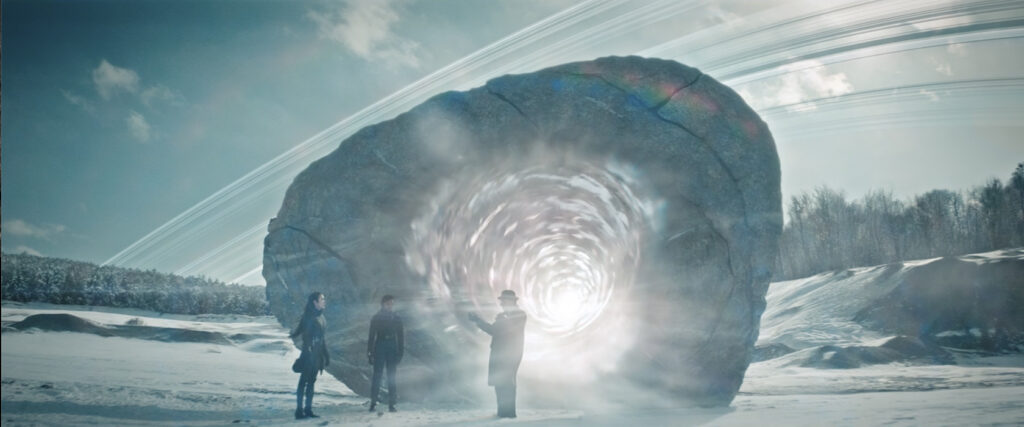
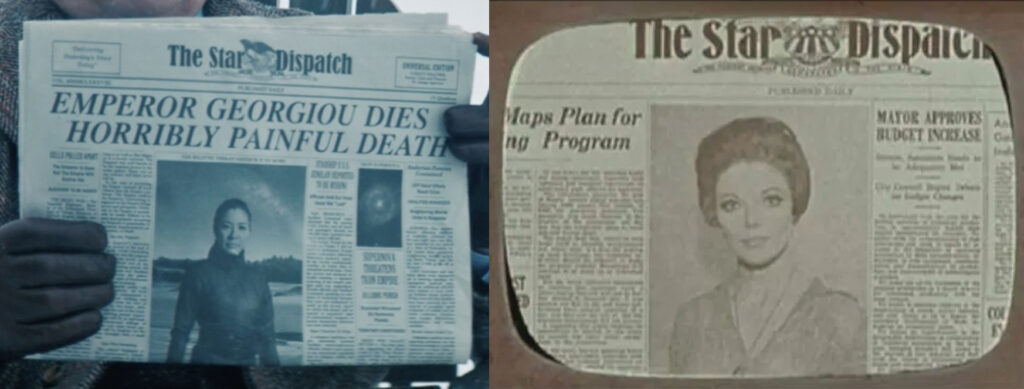
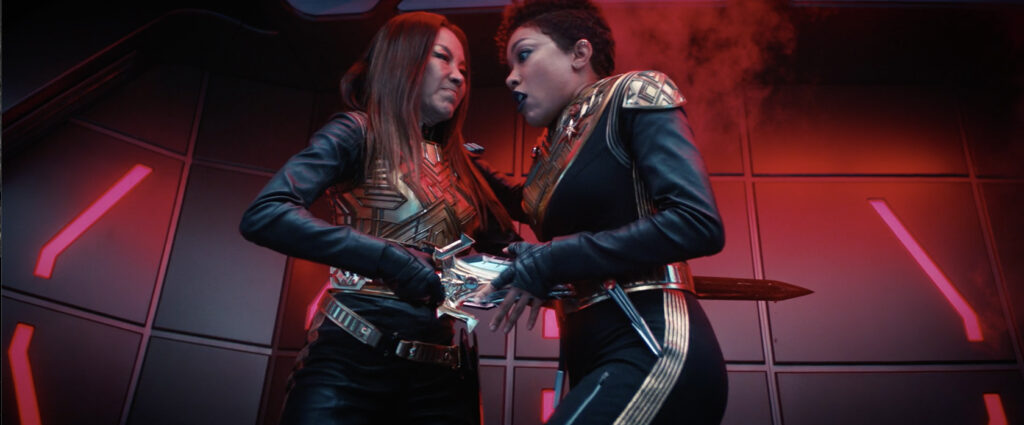
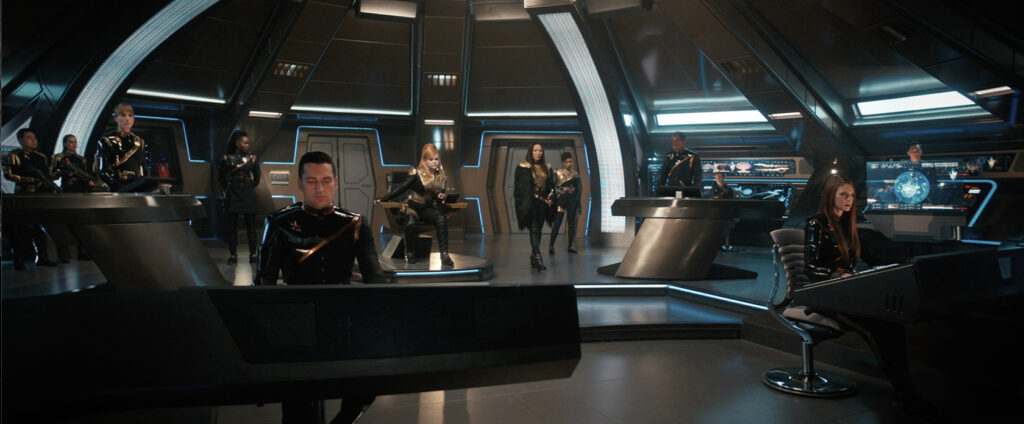
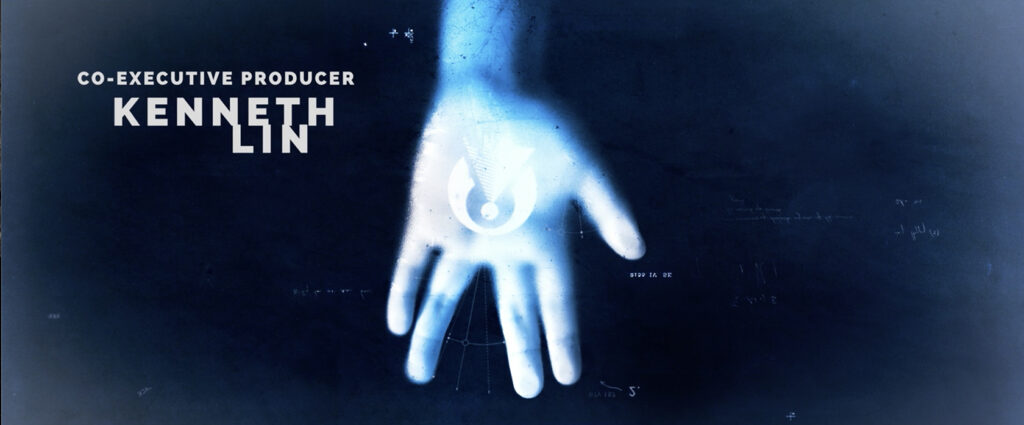
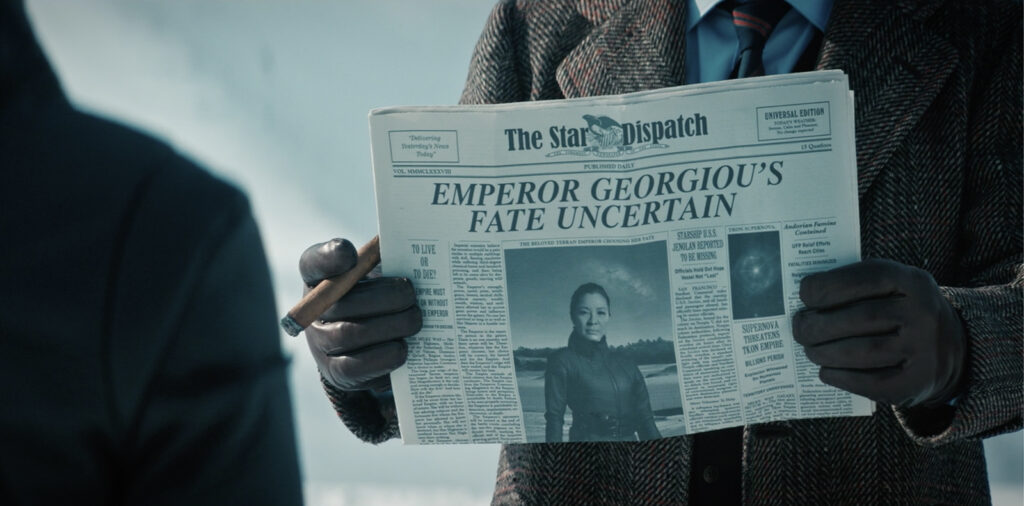
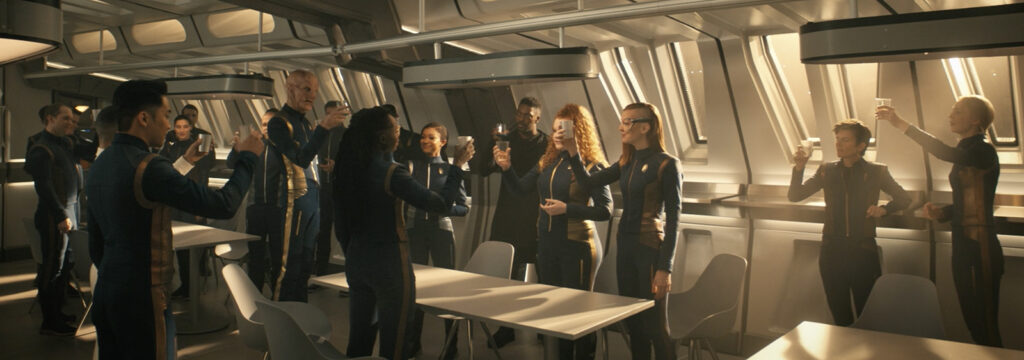
I’m no fan of Disco but I am watching it as it comes out. I say this because I don’t want you to think I’m some rabid Disco fan willing to die for my blind loyalty to the show. I’m not. That said, your rant against this episode doesn’t land with me. You seem to be making the assumption that the Guardian of Forever can only do one thing because in the past it has only been shown doing that one thing. There is no reason to assume that the Guardian of Forever can only do one thing. Perhaps in addition to sending people through time it can also create pocket realities where it can test people to see if they deserve a chance to live. Star Trek has just never had a reason to put these capabilities on screen until now.
I’m not saying that the writers are never allowed to change the established rules. Simply putting the Guardian on a different planet did that. But at least the explained the latter. With your whole pocket universe theory, it’s only a fan theory. If the writers are relying on fans to do the job of explaining the irregularities and inconsistencies, then the writers aren’t doing their jobs.
My apologies, I didn’t see these comments before posting my own, so this applies to what i wrote as well (although it looks like my paragraph breaks got lost?) My take on this, however, is that is exactly what writers do ALL THE TIME! Arguably there is a fine line between spoon-feeding us everything and, essentially, assuming we’re not smart enough to grok it, and not telling us anything and letting us fill in the blanks… I would argue that show writing like this has evolved far more to the side of letting us fill in those blanks, and that part I’m OK with. Heck I’ve become the go-to guy when my friends all look at some movie or show for something that makes no sense and coming up with an entire off-screen reason exactly why that thing could make total sense! It’s have the fun of these, for me ;). Obviously which approach a writer takes may be more preferable to some than it will to others.
Both episodes went to prove that SMG has limited acting chops, very limited, when compared to Yoh, or just about any of the other actors on the show. She didn’t do much except cock her head and shoulder, looking more like Marty Feldman without the hump, or like she was auditioning for a first season Ferengi role, than some bad-ass. She chewed the scenery without much finesse. As for the “I only do it one way” Guardian suddenly becoming quite flexible, mobile, and personable that was just writers who don’t understand the rules of writing that say, “Once you’ve established the rules for you Universe, don’t go changing them willy-nilly, unless you want to lose your credibility.” They’ve shown they aren’t that skilled writing around the issues. Hell, with the whole morality test, Carl should have been a Q.
I hope the first commenter (above) reads your comment, J.
Exactly my feelings, well put!
I haven’t been paying any attention to STD this season. But I’m so pissed they have corrupted the Guardian of Forever. It’s insulting that they would soil such a great piece of Star Trek history with their filthy presence.
Actually, it was a pretty cool reveal and very acceptable to me as a fan to see the Guardian in Discovery. I just didn’t like the writers breaking the rules.
My takeaway starts with the revelation that this was only a test – and it’s easy to surmise “Carl” wasn’t going to put reality at risk weighing whether Georgiou had grown and would make different choices. In computing terms, you do that in a test environment, not the production environment.
So Phillipa didn’t simply go back to her past in the “production” environment (reality) – but into another version of the past, one either created specifically by the Guardian for the purpose of the test. That’s also the reason Phillipa came back without any physical injuries.
(Alternate theory: She went into another “mirror universe,” just similar enough for the purpose at hand, but with no lasting impact on the mainstream reality.)
The other big difference here is that she went back into past where she already physically existed…. and so was either swapped in for the Georgiou of that time, or somehow merged with or inhabited her consciousness. With that in mind, you can then go nuts trying to rationalize how Georgiou’s “Fitbit” went and came back with her (along with its data), compared to the aforementioned injuries which did NOT come back with her.
(IMHO, since “Carl” was a tribute to Carl Sagan, it’s not a stretch to note that this simply works like things did in the book (and movie) “Contact” – and leave it at that.)
There are other aspects of the Guardian’s usage here that some will take issue with, particularly when compared with “City on the Edge of Forever”:
1) Why were no time distortions encountered when approaching Dannus V as there were in “City”?
2) What enabled the Guardian to move between planets when that capability wasn’t revealed before?
3) Why did the Guardian develop a humanoid avatar through which to speak?
4) How can the Guardian take on a more active role in testing people, determining when/where to send them, etc.?
To all that, I simply hold that just because a function hadn’t been seen before didn’t mean it didn’t exist, or couldn’t develop. Especially the Guardian’s means for interacting with “modern” intelligent life after untold years of being alone on its previous planet. There’s simply far more to the Guardian’s backstory that we know, or likely will ever know, and that’s up to the writers to invent/reveal as they see fit. And the Guardian can pretty much do whatever he – or Carl – wants.
My feeling is that the fans shouldn’t have to do so many backflips in order to reverse-engineer and explain away the inconsistencies.
Ah, but the backflips aren’t all that necessary – for the vast majority of viewers, the Guardian said this was a test and so it was. That’s a different scenario than Kirk and Spock chasing McCoy into the past to fix the future, thus no reverse engineering required.
It’s just those of us who feel the need for mental exercise that get to do the backflips – but that’s our choice, isn’t it?
It’s your choice, indeed, Charlie. It’s my choice to kvetch for 2,000-2,500 words each week. Not sure which one of us is wasting more time…probably me. 🙂
Plot issues with time travel? Well I never.
Ironically, this is the first time I’ve got ahead of the game and managed to find time to watch the episode in question before your blog came out. Yes, I did enjoy it (by and large) but your point of view is always welcome.
I’m not entirely sure where/when Georgio went. Did she do a Sam Beckett? Was it all a construction to show that trying to influence events in her time were futile? Yet she aged 3 months, so she must have gone somewhere, didn’t she? Anyone watched Contact or read the book? Yet if she came back, who was it that was left behind? Or did the writers paint themselves into a corner? I don’t know.
All I can say is that as the Guardian was dealing with a parallel universe so events would be isolated to an extent. Also, if such a being with that quite of power were to exist whose to say that we’d understand its abilities when it came to frigging causality to suit its own ends. This is kind of advanced God level stuff were talking about, I don’t think we’re qualified. 🙂
I should confess that I normally watch Discovery while pedalling hell for leather on my exercise bike. That way I don’t over think it, which is probably for the best and, on that basis, I’m still enjoying this series. They do still 3 episodes to screw it up admittedly. I wouldn’t rule out someone coming out of the shower and it all being a dream. For what it’s worth, I kind of hope the new setup continues and that they don’t find an easy or full solution. I’m quite enjoying their quest to restore order to a broken galaxy, kind of allegorical to our present times.
Merry Christmas and let’s hope for a better 2021.
Since Georgiou was sent back to the Mirror Universe to a time BEFORE the Prime Discovery crew crossed over in the first season, anything she changed (people she killed) would have affected the Discovery crew’s experiences there. This includes Landry and Stamets now being dead but also the fact that Empress Georgiou is dead, too. And if she’s dead BEFORE Discovery-Prime arrives, then they obviously can’t take Mirror-Georgiou back with them. And if she doesn’t come back with them, then she never goes to the future, starts to unravel on a molecular level, and requires the crew to go find Carl. In other words, if this episode really did happen, then that means that it really didn’t happen! 😉
Anyway, Alastair, here’s hoping you have a great Christmas and that, yes, 2021 not suck as badly as 2020.
Actually, you don’t KNOW how the Guardian work. You ASSUME it works one particular way based upon a single TOS episode. That doesn’t mean it always has and always will work that way, or even that it truly even worked the way it said or seemed to at the time. Perhaps it worked that way at the time Kirk and Spock used it, presumably built as a tool to travel to the past it would show its user where and when it would take them, or perhaps it showed it in a way the user would understand, and thus it appeared as it did to Kirk and Spock, but it seemed it may also be some form of intelligence on its own, and perhaps it changed over time itself, maybe even modifying its purpose. Or maybe it’s purpose was a form of test all along, testing Kirk in TOS to see if he would do the “right thing” there as well by making him THINK his actions had those specific consequences and that they WOULD modify the future. We don’t really know that the “rules” you’ve outlined actually apply to the Guardian in any way at all. Heck, we don’t really even know if we even truly understand the rules (after all Einstein himself though the “rules” of the Universe would be broken by quantum entanglement, but that doesn’t appear to be the case at all). Not that it matters, it is fictional after all.
Also the statements that “But there’s no more time travel in the future—treaties and a civilization resisting temptation have ensured that Discovery can’t go back in time. There’s no machine or method that would allow them to do it.” are patently wrong, but the simple methods for doing so you outlined earlier in your post. Nothing actually prevents the whole slingshot-around-the-sun-and-go-back-on-time! maneuver, after all, without ever having to use the Guardian. In any case even using the Guarding might not be “using” the Guardian, since if it is an intelligence that has grown and learned over the centuries (millennia, really, if we count it’s entire presumed existence time, and how do we even know it perceives or lives through “time” the way we do anyway?) instead the Guardian may be “using” the crew!
All of that being said, I’d largely agree with you that these MU episodes were more “meh” than anything else, and, as much as I also love Michelle Yeoh as an actress and her ability to play a character like MU Georgiou, I wasn’t all that enamored of Georgiou, either. If anything like other aspects of the series you’ve mentioned before it felt as if her transformation was more than a little rushed, in part because the writers seemed to be very slowly (very slowly) moving her to a more enlightened way of thinking but then suddenly the last two episodes saw both a slide back towards the more “evil” ways and a super fast move towards “reformed” that was well past where it seemed the character had been the rest of the season. So, yeah… meh.
I’m all for fans trying to explain away the occasional writing glitch, Lenny. For example, in “The Enterprise Incident,” Kirk orders Warp 9…even though the Enterprise can only go up to Warp 8. Or trying to figure out how Ambassador Robert Fox beamed down to Eminiar VII in “A Taste of Armageddon” even though shields were up.
But this seemed pretty major. All of your “maybes” tried to tap dance around the simple fact that the Guardian worked differently in “City” in a major way: something done in the past affected the present. Period. To set reality right again, you had to go back and undo it. Indeed, one would assume this is what the Temporal Wars were all about…as going back in time to create alternate universes doesn’t affect you or your enemies in this timeline. So I just don’t buy into the whole, “maybe the Guardian has changed…” argument. It’s too major of a change to let it just be assumed and glossed over.
As for the “there’s no time travel in the future,” I’m afraid my sarcasm didn’t come through on that clearly enough. Of course you can still time travel, but it’s illegal. It’s also illegal to sell heroine, and yet people still do it. As such, I take the “no time travel” thing with a huge grain of salt…but the writers don’t. The needed to set up the future in such a way that the “easy fix” (just slingshot back in time and stop the Burn) was not available to the Federation. It’s not that they CAN’T travel back, it’s that they WON’T…and neither will anyone else in the galaxy–good or evil. For me, that’s a LOT to swallow, but the writers need to create their situations and conflicts in order to have a show. Therefore, no time travel method available (other than the Guardian). The writers have spoken!
Sorry, but you’re OK with fan explanations for why the Enterprise can be ordered to go to Warp 9 when it’s been stated it’s max warp is 8, but suggesting the Guarding is completely capable of working in a different manner than it did in a single ToS episode is beyond the pale? That seems like a pretty contradictory position to me. It doesn’t matter that I put a “maybe” before any or all of those scenarios, it’s really exactly the same thing as any explanation anyone provides for seeming inconsistencies in a given fiction. All a writer has to do is pick any one of those explanations, toss it into a script and then *BOOM* it’s canon, right? You might not like it. You might just really, really want the Guardian to only work the way it worked in that on ToS episode and think to yourself “That’s it! No other way the Guardian can work. Period.” but that wouldn’t invalidate other possibilities. All that does is mean they way you think the Guardian should work is the only way it will every properly work as a fictional device for you. That’s fine, but I’d rather not be locked into just one explanation when there are so many other possibilities that would really be just as viable if it were just explained that way. But again, do you also want the writers to spoon feed everything to us like that? If it gets in the way of the story just to placate a few fans then, honestly, I’m OK with them leaving it out.
I just don’t see that as a huge sticking point as it would appear to be for you. There are plenty of reasons to find the past two episodes as being “meh”, but for me that just really wasn’t one of them. And, indeed, I preferred it over something like Q.
Oh, the episode was still “meh.” My only (big) issue is that “City” told a beautiful, gripping, and tragic story that worked for one main reason: the Guardian couldn’t fix what McCoy did…only Kirk and Spock could do that. And for Kirk, it meant a huge sacrifice of his personal happiness in order to save, well, everything. Were the Guardian able to hit the “reset” button for them, then the entire sacrifice becomes unnecessary and meaningless. So this isn’t just explaining Kirk ordering Warp 9 as, “He really meant Warp 8 but push it over the limit to get us out of here as fast as possible.” This is one episode literally contradicting everything that makes the other episode so impactful. And remember that the Guardian originally said, “I cannot change” to Kirk and the landing party.
Look, I realize I ruffled a lot of feathers with this blog. Good! I love a decent Star Trek debate. Just don’t expect me to change my opinion easily. But it’s just that: an opinion. Folks are welcome to disagree. Fans have been doing that since before our sun burned hot in space… 🙂
Of course it’s just an opinion, as is mine, and my feathers most definitely are not ruffled at all! It’s just I don’t think that this invalidates “City” in any way at all. That was a fantastic episode, but it was poignant and meaningful because they believed the Guardian when it said “I cannot change”, but in no way did that mean it was absolutely true that it could not. And maybe it could not in that case. Both realities can completely be valid here. Now if this were a great episode I might care more to change your mind about that sticking point for you, but hey, it wasn’t all that so feel free to ignore it happened. 🙂
Ah, to be able to ignore Star Trek…’tis a dream to aspire to! 🙂
Backflips aren’t required for the vast majority of fans – it’s just a given that the Guardian is clearly a powerful space-time force beyond our full understanding, thus if that’s how it works/appears in this episode, so be it. Again, it’s pretty easy to understand that this was a test, not the same as Kirk and Spock chasing after McCoy to avoid saving Edith and changing all of reality.
I realize I was playing the Devil’s anal-retentive advocate in identifying additional potential quibbles, but I don’t think most viewers would go there.
I’ve had a “thing” about Discovery since the beginning. I was happy to skip the first two seasons finding your reviews helpful in confirming that decision.
Season 3? Ah me. I first thought that I would start watching after it began feeling that I knew the characters and plot enough from your reviews and elsewhere to be able to ‘catch up’, as it were, with what was going on.
As the weeks went by and my other activities took center stage, I did not get around to it.
Now, this episode came and your verbal bat’leth expertly took apart the episode and brought me full circle back to not being interested enough to do more than read plot summaries after the episode.
In the end it comes down to whether or not I trust the writers long term. Outside of occasional clunkers, do I expect each episode to be basically well written or not. With Discovery, my answer is ‘not’. Even when they are good, I take it as a happy accident.
And part of that ‘not’ is lack of creativity. The better shows don’t need to drag in something from another series unless it’s truly needed. For example, they could have had “Carl” but without the headache inducing retconn (at best) that it engendered.
I’ll be reading plot summaries for Discovery to see if you are a prophet or not when it comes to future plots and be looking forward to the new season of Picard.
I can’t force you to watch Discovery, Jerry, but I’d hate to think I was the only reason you’re NOT watching it. I’m quite literally keeping you away from Star Trek…what a sin! But seriously, if you’re interested enough in the series to read my blog reviews, maybe you should at least give a few episodes a chance. That said, it’s also probably completely spoiled for you by now. 🙂
Charlie, I think that viewers will, in fact “go there”. I think that viewers actually want to dissect each episode and come up with a conclusion , then sit back and see if it comes to pass. That, in my opinion, is part of the enjoyment derived from this franchise and what keeps fans with it episode after episode. I know that it has kept me watching since seeing the first episode in 1966.
As far as the Guardian of Forever goes, Jonathan, I think that you are way off base with your conclusions, as well as with most of your other conclusions. You’re basing your conclusion on a few lines in one episode of TOS. I find it hard to produce such profound wisdom from such miniscule information, and to use that to proclaimed everyone who has voiced an opinion to be wrong. It seems far more logical and reasonable that The Guardian would reveal only minimal capabilities to Kirk and crew , having just encountered them, than to blab about everything that it can do. Remember that shortly before Kirk and Spock went back in time, that a crazed and delusional McCoy ran into the portal. I would think that would make any rationally thinking being be a bit protective. Also, as The Guardian could be classed as a sentient being (if I’m not mistaken), wouldn’t it make sense that such a being continue to learn and evolve? The time frame between “City on the Edge of Forever” and the appearance of Carl wasn’t just a few weeks, but was closer to a millennium! I think that allows some time to update the portal’s operating system, don’t you think? Also, maybe, just maybe, there might be a connection established with another woman of Asian descent, like. for instance, Empress Hoshi Sato. That would be a fun twist to canon.
Everybody has an opinion. They may be right, or may be wrong. I think part of the greatness of this franchise is comparing thoughts on it and learning from each other. When everyone is pronounced as wrong publicly. and you declare that you are the only correct one, it takes the enjoyment out of it. Johnathan, as you told Joshua, your editorial is “only a fan theory”. If you’re not sitting in with the writers, producers, or directors, then you know nothing more than the rest of us do. thus making what you say just a fan theory. Don’t ruin the enjoyment that we get out of this franchise like so many have before you. I’m done with my rant; I have said my piece. I will say no more.
This is just lively debate, Dan. I’m not telling anyone that they’re 100% wrong, but I am standing up for my fan theory…politely, I hope! I don’t think I’m being nasty about any of it. Might the Guardian have “evolved” in a thousand years? Sure. But the Guardian is over 4.5 billion years old, so “evolving” in as little as a thousand years is like the wink of an eye for Uncle Carl. That doesn’t mean I’m telling you you’re wrong, my friend…only that you haven’t done enough to convince me I’m not right. 🙂
“I was made to off the past in this manner. I CANNOT CHANGE.” Enough said.
And yet in Yesteryear, written by DC Fontana, it DID appear to work differently. The Guardian was able to provide a portal to the specific time and place of Spock’s request: “I wish to visit the planet Vulcan, 30 Vulcan years past. The month of Tasmeen, location: near the city of ShiKahr.”
“The time and place are ready to receive you.”
That was different from how it worked in “City,” when Spock said, “I believe I can approximate just when to jump, perhaps within a month of the correct time, a week if we’re fortunate.”
So perhaps the Guardian’s abilities were broader than originally inferred from its response to Kirk’s question, “Can you change the speed at which yesterday passes?”
That sounds rather poetic, but seems to ask about the passage of time itself, not the manner of observing it. It wasn’t as precise as asking, “Can you slow the rate at which you display the passage of time?” Or even better, “Can you provide a portal to a specific place and time?”
It’s possible that the Guardian was always able to show a specific time, but the main issue is that the Guardian was not able to hit “reset” or create an alternate parallel timeline. If that had been true, then Edith Keeler could have died in one reality and lived in another.
Ah, but the nature of the incident was different – McCoy, Kirk and Spock actually went into the past “for real” rather than as part of a test initiated by the Guardian. And the Guardian itself doesn’t change events or hit “reset” in this episode, either. Just as in the past, the traveler’s actions are the key:
City on the Edge of Forever:
Kirk: “Guardian, if we are successful…”
Guardian: “Then you will be returned. It will be as if none of you had gone.”
Yesteryear:
Kirk: “Is it possible for Spock to return to Vulcan and repair the timeline that has been broken so that all is the same as before?”
Guardian: “It is possible. If no other major factor is changed.”
Terra Firma, Part II:
Guardian: “Back in the day it used to be, ‘Sure, come on through. Just don’t screw up history or you’ll have to fix it.'”
“Everyone was killing everyone else. And trying to use me to do it.”
“You weren’t sent back to be cured. You were sent back to be weighed… to figure out your course.”
As for creating alternate timelines or “test” environments – again, not seeing an ability does not mean it doesn’t exist. And with something as powerful as the Guardian – it’s not out of the range of plausibility.
Yeah, I’m just not buying into it. That said, what’s done is done. No one’s gonna go back and reshoot the episode. I just don’t have to like it. Heck, I still complain about Star Trek V, too. That doesn’t mean that I don’t accept what happened (that Starfleet sent a ship without a working transporter into a hostage situation, that the Enterprise has 78 decks, and that no emergency medical team is sent to the hangar deck after a shuttle crashes carrying all but two of the most senior officers on the ship). Star Trek is full of crap that I love to complain about!
Jonathan,
Don’t worry. It’s not just you that soured me on Discovery. But you helped by giving details and perhaps a wee bit of confirmation bias as well to the distaste I felt when I saw ‘new Klingon’ faces and other aspects.
There’s also the pattern of my life including the willingness of my wife to watch Picard with me in a “pick the best show and I like Picard’s actors” marital harmony offer from her.
In the Lane house, Wendy just walks out of the living room and goes upstairs to bed when I tun on “The Boys.” 🙂
Jonathan, first I want to say I look forward to reading your blog weekly and usually agree with you, or when I don’t you provide some interesting counter thoughts to what I think.
I agree with you on the whole Paradox that the episode created with the MU and the way the Guardian worked (tho I loved Carl, one of the best supporting characters so far)
Here is my issue with the episode.
Georgiou is sent to some place in time (I assume in the prime universe) where the mirror and prime universes are closer together. That means she was sent to a time in the past of where Discovery is now. She knows of the Burn, she knows a ton of things that happened in the future, she’s been there long enough to have read up on everything she can. That should mean that the minute she walked through the Guardian that the present would have changed, but it did not seem to. I don’t see that with what she knows, she never did anything that would not have change the course of history. Just her being there should have changed something in Discovery’s present time. She also does not seem like the type that would have just found a quite place to settle down and say out of the way of history like Picard ordered in First Contact. The whole lets pretend she’s dead when she should be somewhere in some database (maybe that’s for a future episode after Section 31 comes to air)
I have to agree with Captain Janeway – Since my first day on the job as a Starfleet Captain I swore I’d never let myself get caught in one of these godforsaken paradoxes – the future is the past, the past is the future, it all gives me a headache.
Yep. The biggest paradox is that Mirror-Georgiou dies BEFORE Discovery-Prime ever meets her. So they won’t be able to bring her back to the Prime Universe. And if they don’t, then Control doesn’t die and the Discovery doesn’t go forward in time. Or if they do, Georgiou isn’t with them, so they never go off to find Carl T. Guardian. Paradox indeed!